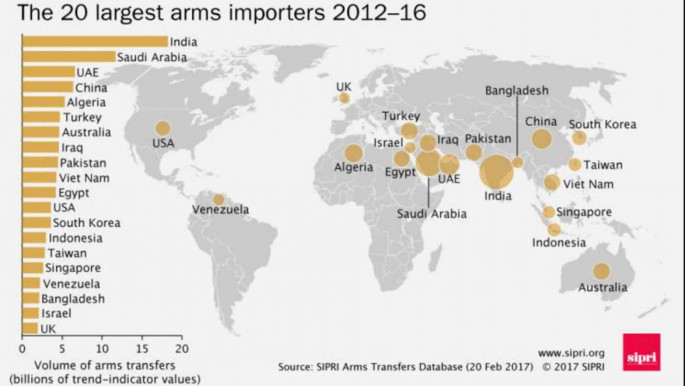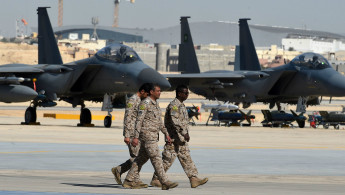Middle East countries ranked among world's biggest arms buyers
Arab governments have been listed among the biggest arms purchasers during 2012-2016, according to a new study by the Stockholm Institutional Peace Research Institute [SIPRI].
"Over the past five years, most states in the Middle East have turned primarily to the USA and Europe in their accelerated pursuit of advanced military capabilities," said Pieter Wezeman, a senior SIPRI researcher.
"Despite low oil prices, countries in the region continued to order more weapons in 2016, perceiving them as crucial tools for dealing with conflicts and regional tensions," Wezeman added.
Between 2007–2011 and 2012–2016 arms imports by states in the Middle East rose by 86 percent and accounted for 29 percent of global imports in 2012–2016, the study said.
 |
|
| Between 2007–11 and 2012–16 Middle East arms imports rose by 86 percent [SIPRI] |
Saudi Arabia was the world's second largest arms importer in 2012-2016, with an increase of 212 percent compared with 2007–2011.
Riyadh is currently leading a military coalition of Arab nations in Yemen, where an ongoing war has claimed over 10,000 people since March 2015. The coalition has been accused of war crimes by rights groups and observers.
Arms imports by Qatar went up by 245 percent. Although at lower rates, the majority of other states in the region also increased arms imports.
Algeria was the largest arms importer in Africa with 46 percent of all imports to the region and Egypt was ranked as the 11th largest importer of arms.
The share of countries in the Middle East and the Gulf monarchies jumped from 17 percent to 29 percent, far ahead of Europe (11 percent, down seven points), America (8.6 percent, down 2.4 percentage points) and Africa (8.1 percent, down 1.3 points).
The United Arab Emirates, which was ranked the third largest weapons importer, entered into military contracts worth $1.9 billion including a $700 million contract with Russia this week.
The deal between the UAE and Rosoboronexport – which is owned by Russian state holding company Rostec – will see the Russian arms contractor supply 5,000 anti-armour missiles in addition to training and logistic support.
It comes at a time when Russia is seeking to expand its military investment in the Middle East, as evidenced by the recent development of military bases in Syria, and the holding of joint military exercises with Egypt last year.





 Follow the Middle East's top stories in English at The New Arab on Google News
Follow the Middle East's top stories in English at The New Arab on Google News
![Netanyahu furiously denounced the ICC [Getty]](/sites/default/files/styles/image_330x185/public/2024-11/GettyImages-2169352575.jpg?h=199d8c1f&itok=-vRiruf5)
![Both Hamas and the Palestinian Authority welcomed the ICC arrest warrants [Getty]](/sites/default/files/styles/image_330x185/public/2024-11/GettyImages-2178351173.jpg?h=199d8c1f&itok=TV858iVg)
